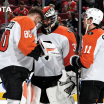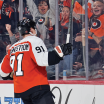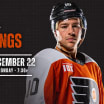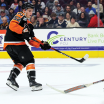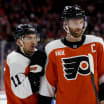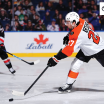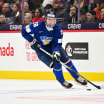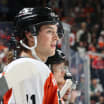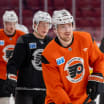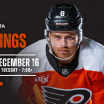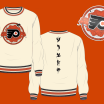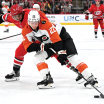Several generations of Philadelphia Flyers players will reunite on Nov. 15 for the Flyers Alumni Hall of Fame Game: a celebration of the impending Flyers Hall of Fame inductions of Paul Holmgren and Rick Tocchet the next night. For game purposes, "Team Holmgren" will play against "Team Tocchet". In reality, though, it's just one big family reunion both on and off the ice.
Alumni Hall of Fame Game: A Flyers Family Reunion
Several generations of Philadelphia Flyers players will reunite on Nov. 15 for the Flyers Alumni Hall of Fame Game: a celebration of the impending Flyers Hall of Fame inductions of Paul Holmgren and Rick Tocchet the next night.
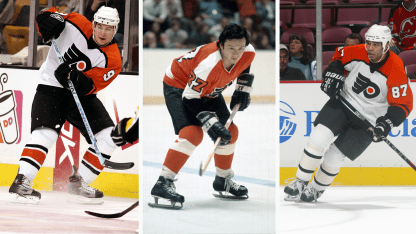
By
Bill Meltzer
philadelphiaflyers.com
Here's a look at all of the participating players, coaches and off-ice participants attending the event.
PLAYERS
Donald Brashear (LW): One of the most fearsome NHL tough guys of the mid-1990s to late 2000s, Brashear spent all or portions of five years with the Flyers in the early 2000s. Only the bravest willingly went toe-to-toe with "Brash". In non-fighting situations, Brashear was effective along the boards and was very difficult to take off the puck in battles along the walls. He also had an underrated touch around the net when deployed in situations where he could chip in some supplementary offense.
Daniel Briere (C/RW): After signing with Philadelphia as an unrestricted free agent on July 1, 2007, Briere spent six seasons with the Flyers. For his Philadelphia regular season career, "Danny" compiled 124 goals and 283 points in 365 regular season games. Briere was one of the best playoff performers in Flyers franchise history. In 68 playoff games, he racked up 37 goals (13 power play goals), 35 assists, 72 points (1.06 points per game) and nine game-winning goals. His performance in the 2010 Stanley Cup Playoffs was extraordinary. Briere played a pivotal role in bringing the Flyers to within two victories of the Stanley Cup as he produced 12 goals and 30 points in 23 games.
Dave Brown (RW): "Brownie" was one of the top enforcers in the NHL from the mid-1980s to mid 1990s. In two separate playing stints with the Flyers, Brown played a combined 552 regular season games with 78 points (39 goals, 39 assists) and 1,382 penalty minutes. The hulking right winger also dressed in 80 career playoff games (two goals, five points, 209 penalty minutes). A member of the 1990 Stanley Cup winning Edmonton Oilers, Brown played 26 career playoff games with the Oilers and 54 with the Flyers. As a Flyer, Brown had four career playoff points (two goals, two assists) and 173 penalty minutes. Few policemen in Flyers - or NHL - history understood and executed their role better than Dave Brown during his two stints in orange and black.
Linsday Carson (LW): A hard-nosed two-way forward, Carson was on the penalty kill and played a gritty brand of hockey, Carson had 67 goals, 137 points and 495 penalty minutes over his 346-game regular season career in Philadelphia. He also dressed in 44 playoff games. As a member of Mike Keenan's 1984-85 squad that reached the Stanley Cup Final, Carson had the lone 20-goal season of his NHL career. Two years later, in the 1987 Stanley Cup Final against the Edmonton Oilers, Carson scored the goal that started the famous comeback in Game 6. The Flyers trailed 2-0 as the game moved 27-plus minutes into regulation. Carson scored to cut the deficit in half. Later, goals by Brian Propp and J.J. Daigneault tied and then won the game for the Flyerst to force Game 7.
Riley Cote (LW):A member of the Philadelphia Phantoms' 2004-04 Calder Cup winning team. Cote wound up spending three full seasons - including two as a lineup regular - with the big club. Overall, Cote dressed in 156 regular season games with the Flyers (411 penalty minutes) and three playoff games in 2008. Cote, who had seven career NHL points, scored his lone NHL goal on Feb. 17, 2008, late in the third period of a 5-3 home loss to the Montreal Canadiens. His most memorable fight was a one-punch knockout of the Tampa Bay Lightning's Andre Roy in the second period of a Flyers' 3-2 home win on March 6, 2008.
Murray Craven (C/W):Perennially underrated, speedy and a highly effective player with or without the puck, Craven was versatile enough to play any forward position as needed. He topped the 75-point mark twice during his Flyers career and had at least 60 points in four of his seven-plus seasons in Philadelphia. Over that span, the player known as "Crafty" or "Muzzy" notched 25-plus goals three times, hitting the 30-goal plateau once. His best season offensively came in 1987-88, when he tallied 30 goals (six on the power play, two shorthanded) and 46 assists for a team-leading 76 points in 72 games.
Per-Erik "Pelle" Eklund (LW/C): Eklund was one of the smoothest skaters and gifted playmakers to play for the Philadelphia Flyers. "Pelle" spent eight seasons in Philly. One of the best passers in Flyers' franchise history, Eklund won the Bobby Clarke Trophy as the Flyers' most valuable player during the 1990-91 season. He reached to 50-assist milestone three times during his Philadelphia career and topped 40 assists four times. He was dominant in the Wales Conference Final against the Montreal Canadiens in 1986, taking over the series with his speed in transition and soft hands.
Robert Esche (G):Nicknamed "Chico" after former Islanders, Devils and Flyers goaltender Glenn "Chico" Resch, Esche was a much more aggressive goaltender than the laid back Resch. He handled the puck well and was an above-average puck stopping goalie when one-on-one against the shooter. Esche spent four seasons with the Flyers. In his first season as a Flyer, Esche appeared in 30 games as the backup to Roman Cechmanek and the duo split the NHL's Jennings Trophy for the lowest goals against average. Esche's best run in Philadelphia, however, came as the starter during the club's 2004 run to within one win of reaching the Stanley Cup Finals.
Todd Fedoruk (LW):Nicknamed "Fridge," Fedoruk used his large frame to be an effective physical presence as well as a player willing to drop the gloves with all comers. In total, Fedoruk dressed in 545 NHL regular season games, recording 1,050 penalty minutes and 97 points (32 goals, 65 assists). He also dressed in 25 career playoff games. His Flyers totals consisted of 268 regular season games, 39 points (13 goals, 26 assists) and 575 penalty minutes as well as seven appearances in playoff games.
Simon Gagne (LW/C):During Gagne's Flyers career, he compiled an extensive list of accomplishments: a member of NHL All-Rookie team in 1999-2000, two-time winner of the Bobby Clarke Trophy as team MVP (2005-06 and 2006-07), Pelle Lindbergh Award winner as the team's most improved player of the 2000-01 season, two-time NHL All-Star Game selection (2000-01, 2006-07), two-time 40-goal scorer (2005-06 and 2006-07) on a line with Peter Forsberg and Mike Knuble, Olympic participant for Team Canada in 2002 (gold medal) and 2006, three-time Toyota Cup winner as the Flyers player with the most three-star selections in the 2001-02, 2005-06 and 2006-07, and an important member of the 2009-10 team that reached the Stanley Cup Final as well as the 1999-2000 and 2003-04 squads that fell one win short of the Finals. In the playoffs, Gagne scored three of the biggest goals in the post-2000 history of the Flyers' franchise. In 2004, Gagne tallied the overtime goal in Game 6 of the Eastern Conference Final to force a seventh and deciding game against the Tampa Bay Lightning. In 2010, Gagne played through injury to score the overtime goal in Game 4 of the Eastern Conference Semifinals that started the Flyers historic comeback from a three-games-to-zero deficit against the Boston Bruins. In Game 7, the Flyers trailed 3-0 in the first period only to storm back and win, 4-3. Gagne capped it with the series-winning goal scored with 7:08 remaining in the third period.
Adam Hall (C/RW): As a Flyer, Hall served as a penalty killing specialist who was very strong on faceoffs. He spent 117 regular season games (four goals, 13 points) with the Flyers over two seasons. In 2014, he dressed in all seven games of the team's Eastern Conference quarterfinal series against the New York Rangers.
Scott Hartnell (LW): A nine-time 20-plus goal scorer in the NHL, Hartnell hit the mark five times in seven years with the Flyers, including seasons of 37 (2011-12) and 30 (2008-09) goals. He topped the 100 penalty minute mark (with a high of 159 in 2007-08) in all but the lockout-shortened 2012-13 season. Hartnell was part of three different Flyers line combinations that achieved considerable success together. In his 30-goal season of 2008-09, Hartnell mostly played on a line with Jeff Carter and Joffrey Lupul. During the 2010 playoffs, Hartnell was placed with Danny Briere and Ville Leino in a trio that scored at a torrid pace (including eight goals and 17 points for Hartnell) after it was put together. The line remained intact for the 2010-11 season. In 2011-12, Hartnell enjoyed his career year on a line with Claude Giroux and the legendary Jaromir Jagr.
Mark Howe (D): Almost universally regarded as the best offensive and best all-around defenseman in Flyers franchise history, the Hockey Hall of Famer made a mid-career switch (at age 25) from high-scoring left wing to full-time defenseman. As a Flyer, Howe was a three-time top runner-up for the Norris Trophy. His +85 rating in 1985-86 was the best in that category in Flyers franchise history and among the top in NHL history. That season, Howe won the Bobby Clarke Trophy as Flyers MVP as well as one of his four Barry Ashbee Trophies as the Flyers' top defenseman. No matter who was his partner - Glen Cochrane, Brad McCrimmon or Kjell Samuelsson - Howe excelled. However, his most effective duo came alongside the late McCrimmon; affectionately nicknamed "the Beast." Howe's fearsome wrist shot, deft passing touch and speed -- the same elements that previously made him a top top left winger - served him well as a defenseman, too. He also had a very quick defensive stick and outstanding hockey sense that more than compensated for whatever he lacked in terms of size.
Mitch Lamoureaux (C):A legendary player for the Hershey Bears when they were the Flyers' AHL affiliate and a member of the American Hockey League Hall of Fame, Lamoureux also had brief NHL stints with the parent cub. A prolific scorer with a Tasmanian devil-like style on the ice, the feisty 5-foot-6 forward hit the 35-goal milestone four times (with a high of 45 goals and 105 points) for the Bears. Lamoureux was pretty much a career minor leaguer but dressed in 73 NHL games, scoring 11 goals and 20 points. For the Flyers, Lamoureux dressed in three NHL regular season games for Mike Keenan's squad in 1987-88.
Reggie Leach (RW): Playing along Hockey Hall of Fame inductees Bobby Clarke and Bill Barber on the LCB Line, Leach's goal-scoring prowess earned him a spot in the Flyers Hall of Fame. He tallied 45-plus goals three times as a Flyer. To this day, Leach still holds numerous Flyers goal-scoring records. In 1975-76, he set a still-standing mark for the most goals in season (61) and postseason (19, setting an NHL record that he still shares with Jari Kurri). That same spring, he set club records for the most goals in a single playoff game (five, against Boston) and 10 consecutive playoff games in which he scored a goal. He won the Conn Smythe Trophy as the NHL's playoff MVP in 1976. Leach was best known for overpowering slapshot but he also possessed a tricky backhander. He also had underrated skating ability. Leach played in three separate Stanley Cup Final series as a Flyer and was part of the 1974-75 squad that won the championship.
John LeClair (LW): For the Philadelphia portion of the United States Hall of Fame and Flyers Hall of Fame career, the big winger racked up 333 goals and 643 points in 649 games. Along with Tim Kerr, LeClair is the only player in Flyers' franchise history to score 50 or more goals in three straight seasons. LeClair's stellar production came during an era in which clutch-and-grab hockey and heavily use of neutral zone trapping systems contributed to a league-wide decline in scoring on almost an annual basis. Although he did not play an overtly "mean" game and tended to be slow to anger, LeClair was plenty physical. It was a common sight for opposing players to be left sprawled on the ice near LeClair. He simply had to dip his shoulder and it was almost always the opponent who took a seat. LeClair was also blessed with a howitzer of a slapshot and would score about six to eight goals per season by winding up and blasting an overpowering shot past the goaltender from anywhere from the blueline to the mid-slot.
Eric Lindros (C): The Hockey Hall of Fame and Flyers Hall of Fame inductee centered the Crazy Eights line (with Mark Recchi and Brent Fedyk on the wings) and the Legion of Doom (flanked by LeClair and Mikael Renberg): two of the most successful combos in team history. Although plagued by injuries during his career, the 6-foot-5 Lindros mixed a rare combination of brute force and skillful finesse to make for an often-unstoppable force when healthy. The Flyers' franchise all-time points-per-game leader (1.35 points per game), Lindros racked up 659 points (290 goals, 369 assists) in 468 regular season games with the team, along with 946 penalty minutes. In 50 playoff games, Lindros posted 57 points (24 goals, 33 assists). Winner of the Hart Trophy and Lester Pearson Award (now called the Ted Lindsay Award) in 1994-95, a finalist for the Hart the next season, Lindros played in six NHL All-Star Games during his years in Philadelphia. He captained the 1994-95 Flyers team that came within two wins of the Stanley Cup Final and the 1996-97 squad that won the Eastern Conference Championship in route to the reaching the Stanley Cup Final. During his time with the Flyers, Lindros also represented Team Canada at the 1996 World Cup of Hockey and captained the Canadian entry at the 1998 Olympics.
Brad Marsh (D):A heart-and-soul player, Marsh was also a team leader during his eight seasons in Philadelphia. was a solid positional defenseman who took away the slot and net-front from opposing forwards and used his size and strength (6-foot-3, 220 pounds) to ride his check off the play. While he lacked straight-ahead speed, Marsh compensated by maximizing the things he did well. He was an outstanding shot blocker and savvy penalty killer. When Marsh pinned an attacker to the boards, his check wasn't about to spin out with the puck. That gave Marsh's teammates a chance to claim the puck. "Marshy" also had an underrated defensive stick and made a much better first pass up to the forwards than his modest NHL point totals would suggest. He also came to keep himself in outstanding physical condition under the auspices of Pat Croce during the Mike Keenan era. Today, Marsh serves as the president of the Flyers Alumni Association as well as the Flyers Director of Community Development and the head coach of the Philadelphia Warriors hockey team.
Mike McKenna (G): McKenna worked his way up the hockey ladder one rung at a time, starting with portions of two seasons with the ECHL's Las Vegas Wranglers. Most of his subsequent career was spent in the American Hockey League, where he was often a standout at that level, including backstopping the Syracuse Crunch to the 2017 Calder Cup Finals and repeating the feat for the Texas Stars the next year. McKenna had playing stints with seven teams, including playing for the Flyers in 2018-19. During his brief time with Lehigh Valley Phantoms, he rapidly became a fan favorite.
Scott Mellanby (RW):The first chapter of the accomplished power forward's lengthy and distinguished NHL career unfolded as a member of the Flyers under head coaches Mike Keenan and Paul Holmgren. For the Flyers' portion of his career, Mellanby played 355 regular season games (83 goals, 114 assists, 197 points, 694 penalty minutes) and 50 games in the Stanley Cup playoffs (nine goals, 11 assists, 20 points, 90 penalty minutes). He went on to play a total of 1,431 NHL games, producing 840 points and 2,479 penalty minutes. After retirement, he moved on the NHL assistant coaching and front office roles.
Brian Propp (LW):Flyers Hall of Fame member Propp played in five NHL All-Star games as a Flyer and five Stanley Cup Finals overall (three with the Flyers). For his NHL career, he racked up 425 goals and 1,004 points in 1,016 regular season games plus 148 points in 160 playoff games. Additionally, his Flyers career plus-311 rating ranks fourth in franchise history behind only Hockey Hall of Fame inductees Bobby Clarke, Mark Howe and Bill Barber. During the decade-long Flyers portion of his career, "Propper" played 790 regular season games. He compiled 849 points, with 369 goals and 480 assists. O this day, Propp ranks second to Clarke in all-time Flyers playoff scoring, compiling 112 points in 116 games. Propp scored the tying goal in the third period of the Flyers' Game Six comeback against the Edmonton Oilers in the 1987 Stanley Cup Final.
Kjell Samuelsson (D):Standing 6-foot-6, Samuelsson learned how to use his wingspan and positional savvy to his advantage. He also played with a mean streak as part of a physical and courageous style that often saw him sacrifice his body willingly to block opposition shots. A late-bloomer, the blueliner known as "Sammy" or "Duke" (after the Marmaduke comic strip character) did not debut in the National Hockey League until he was 28 years old but he went on to carve out a solid career that saw him play 813 regular season games (48 goals, 138 assists, 186 points, 1,225 penalty minutes) and 123 playoff games (four goals, 20 assists, 24 points, 178 penalty minutes). As a two-stint Flyer, Samuelsson played 545 regular season games, posting a cumulative plus-103 rating and 141 points (35 goals, 106 assists) to go along with 815 penalty minutes. He dressed in 70 playoff games, contributing 16 points (four goals, 12 assists), 98 penalty minutes and a plus-24 rating. After his playing days, he returned to the Flyers organization as a coach.
Nick Schultz (D):A veteran of more than 1,000 games in the NHL, Schultz spent the final three seasons (189 regular season games played as a Flyer). An above-average skater who played a defense-first style at the pro level, Schultz was a mainstay on the Minnesota Wild blueline for a decade. As a Flyer, his best season came in 2014-15. He providing a calming presence, 166 blocked shots, 113 credited hits and was charged with just 23 giveaways in 80 games while averaging 19:02 of ice time, including an average 2:42 per game on the penalty kill. On January 13, 2016, Schultz played in his 1,000th NHL regular season game. By the end of the 2015-16 season, he had 1,041 regular season games and 32 playoff matches to his credit. Today, he serves as a flyers development coach.
Ron Sutter (C): A hard-working, unselfish and gritty two-player who exuded competitive drive, Ron Sutter was a valuable part of the Flyers' overachieving teams of the mid-to-late-1980s. In terms of point production, Ron Sutter's best seasons saw him score 26 goals in just 55 games (1988-98) and post 60 points in 75 games in 1985-86. That year he was also the runner-up for the Selke Trophy as the NHL's best defensive forward. Ron became the Flyers captain during the 1990-91 season. On Sept. 22, 1991, the Flyers traded Sutter and defenseman Murray Baron to the St. Louis Blues in exchange for Rod Brind'Amour and Dan Quinn. Sutter concluded his Philadelphia career with 555 regular season games and 69 playoffs to his credit, as well as 137 regular season goals, six playoff goals, 359 regular season points and 33 playoff points, 854 regular season penalty minutes and 149 playoff penalty minutes.
Chris Therien (D): Even before Therien's longstanding defensive pairing with Eric Desjardins was formed by Terry Murray midway through Therien's third NHL season, the player nicknamed "Bundy" proved to be a mainstay on the Flyers' blueline. Therien was an NHL All-Rookie Team selection in 1994-95 with Dmitri Yushkevich as his primary partner and generally performed well in his second season with veteran Kjell Samuelsson as his most frequent partner. Thereafter, Therien formed a successful tandem with Flyers Hall of Famer Desjardins. After his first Flyers stint ended near the 2003-04 trade deadline when he was traded to the Dallas Stars, for whom he played 11 games, Therien returned to the Flyers for a second stint in 2005-06 before retiring. Therien played 753 regular season games for the Flyers; a franchise record among defensemen. He chipped in 159 points (29 goals, 130 assists), 583 penalty minutes and a combined plus-125 rating. In the playoffs, he played 99 games, posting 12 points (two goals, 10 assists), 68 penalty minutes and a plus-one rating. His best run came in 1997, when he posted seven points and a plus-14 for a Flyers team that reached the Stanley Cup Final. After his playind days, he embarked on a lengthy broadcasting career.
Rick Tocchet (RW):A brand-new inductee in the Flyers Hall of Fame along with Paul Holmgren, Tocchet was the prototypical NHL power forward - and the quintessential Flyer with his combination of toughness, will-to-win and overachieving productivity that was greater than the sum of his natural-born abilities. One of the toughest power forwards of his era, hard work and determination enabled Rick Tocchet to become a perennial overachiever in the National Hockey League in an 1,144-game career that included separate stints with the Flyers at the beginning (1984-85 to 1991-92) and end (1999-2000 to 2001-2002) of his playing career.
Scottie Upshall (RW):A fan favorite and popular player in the locker room wherever he played, Upshall was noted for his high-energy style of play and fun-loving personality off the ice. In 134 games as a Flyer, he scored 27 goals and 64 points. Upshall had multiple strong performances in the Flyers run to the Eastern Conference Finals in 2008, just one season after the club suffered through the worst year in franchise history. Upshall had seven points in 17 playoff games that year, including two goals and three points in the Flyers five-game upset of the Montreal Canadiens.
Joe Watson (D):The pride of Smithers, British Columbia and the older brother of fellow Flyers Hall of Fame defenseman Jimmy Watson, Joe was a member of the inaugural Flyers team and worked for the Flyers for nearly 54 years before retiring in 2021. As a player, Joe was a two-time NHL All-Star and a two-time Stanley Cup winner. Among all defensemen in franchise history, only Chris Therien appeared in morer regular season games than Watson. Whether preventing opposition scoring chances as a mainstay on the Flyers' blueline, working as a pro scout or in the organization's sales and marketing departments, Watson earned his keep and served with distinction. He was elected to the Flyers Hall of Fame in 1996. Back in 1984, Watson co-founded the Flyers Alumni Team and served as its team manager and on-ice mainstay for most of its history.
COACHES
Paul Holmgren (Team Holmgren coach): A new inductee in the Flyers Hall of Fame for his combined legacies as a player, assistant and head coach, assistant and head general manager, team president and senior advisor, the biggest highlights of "Homer's" days behind the bench came with the Flyers. He was an assistant coach under Keenan for the 1987 squad that reached Game 7 of the Stanley Cup Final. Two years later, as Flyers head coach, Holmgren steered the team to Game 6 of the 1989 Wales Conference Final despite a slew of injuries.
Mike Keenan (Team Tocchet coach): As a young NHL head coach, "Iron Mike" led the Flyers to the Stanley Cup Final in both 1985 and 1987. Later, he coached the Chicago Blackhawks to a Stanley Cup Final run and won the Stanley Cup with the 1993-94 New York Rangers; the organization's first and only Stanley Cup championship since 1940. This game marks Keenan's first time behind the bench for a Flyers Alumni game. He coached the New York Rangers Alumni side against Pat Quinn for the Flyers Alumni at the 2012 Winter Classic Alumni game, won 3-1 by the Flyers side.
Off-ice Attendees
Ten additional Flyers Alumni -- including five Flyers Hall of Famers -- have been confirmed to participate in the Hall of Fame Game in non-playing or coaching capacities. The attending Alumni are as follows:
Flyers Hall of Famers
Bill Barber:A member of the Hockey Hall of Fame, Barber was arguably the NHL's best all-around left-winger of the mid-1970s to early 1980s. Spending his entire playing career and most of his post-playing career with the Flyers organization, he's the franchise's all-time leading goal scorer and a member of both the 50-goal, and 100-point clubs (of which only Mark Recchi and the late Rick MacLeish are fellow members of both). His famous No. 7 has been retired by the team. Later, as a head coach, Barber steered the Philadelphia Phantoms to the 1997-98 Calder Cup championship and subsequently won the Jack Adams Trophy as the NHL's Coach of the Year .
Bob Clarke:Arguably the most iconic figure in franchise history along with Ed Snider and Bernie Parent. As a player, "Bobby" Clarke won the Hart Trophy three times as the most valuable player in the NHL. He captained the Flyers to back-to-back Stanley Cup championships, centered the legendary LCB line with Reggie Leach and Bill Barber on his wings, and stands as the franchise's all-time leader in games played, assists and points. The Bobby Clarke Trophy, awarded to the Flyers' MVP, was created in Clarke's honor after his retirement in 1984. As a general manager, "Bob" Clarke presided over three teams (1984-85, 1986-87 and 1996-97) that reached the Stanley Cup Final plus four others (1988-89, 1994-95, 1999-2000, and 2003-04) that reached the Conference Final.
Gary Dorhoefer:A a member of the inaugural 1967-68 team and the 1973-74 and 1974-75 Stanley Cup championship squads, "Dorny" personified tenacity, grit and stoic toughness in playing through injury. He scored 214 regular season goals and 17 playoff tallies in his NHL career. After being selected by the Flyers from the Boston Bruins in the 1967 NHL Expansion Draft, Dornhoefer remained with Philadelphia the rest of his career. For the Flyers portion of his career, he scored 202 goals, 316 assists, 518 points and recorded 1,256 penalty minutes in 725 regular season games. In the playoffs, Dornhoefer played a total of 80 games, contributing 17 goals, 36 points and 203 penalty minutes. Later, Dorhoefer had a lengthy career as a color commentator on Flyers telecasts and his video breakdown segments during intermissions ("Stop it right there!.... OK, let 'er go.") were especially instructive in explaining the details that lead up to notable plays.
Dave "the Hammer" Schultz: The left winger's defining legacy was the fact that he topped 300 penalty minutes in three consecutive seasons (topping out at an astounding 472 in 1974-75), he also had a knack for coming through in the clutch. The Hammer scored 20 goals in the Flyers' first Stanley Cup season and played an important role in each of the three playoff series the Flyers won on the way to claiming the 1973-74 championship. During the regular season that year, Schultz answered questions about his non-fighting prowess by scoring two hat tricks within a week. In the playoffs, it was Schultz who scored the quarterfinal series clinching goal against the Atlanta Flames on the same night he laid a bloody beating on Flames forward Bryan Hextall Jr. (the father of future Flyers Hall of Fame goaltender and current-day general manager Ron Hextall). In the semifinals against the Rangers, Schultz's lopsided Game Seven pummeling of Rangers defenseman Dale Rolfe was demoralizing to the Blueshirts. In the Stanley Cup Final against the Boston Bruins, it was Schultz who set up Bobby Clarke for the Flyers captain's iconic Game Two overtime goal that proved critical to the Flyers winning their first Stanley Cup. For his Flyers career, Schultz played in 297 regular season games recording 51 goals, 115 points, 1,386 penalty minutes and a plus-70 rating at even strength. In 61 playoff games, he had seven goals, 16 points and 363 penalty minutes.
Jim Watson: One half of the only brother duo in the Flyers Hall of Fame along with older sibling Joe, "Jimmy" Watson was a five-time NHL All-Star during his playing career and a two-winner of the Stanley Cup. A serious back injury prematurely ended his career, forcing his retirement at age 30. A smooth skater, excellent defender and fine puck mover (although not a big point-producer), the younger Watson brother was also a locker room leader.
Flyers Alumni non-playing attendees
Bill Clement:A speedy and reliable two-way forward during his playing days, Clement scored an insurance breakaway goal in the third period of Game 6 of the 1975 Stanley Cup Final. After his playing days, Clement enjoyed a prolific broadcasting career on the local, national and even international levels. He will emcee off-ice features during the Alumni Hall of Fame Game.
Bob "the Hound" Kelly: Scorer of the Stanley Cup winning goal in Game 6 of the 1975 Stanley Cup Finals, Kelly was a bundle of energy on the ice. A member of both Flyers Stanley Cup championship teams, Kelly spent a decade in orange and black without ever playing a single game in the minor leagues. Off the ice, Kelly's good-natured sense of humor and outgoing personality made him a favorite of teammates, fans, and reporters alike. A consummate team player, Kelly was a sparkplug in the Flyers Stanley Cup engine. After his playing days, he's been a passionate and tireless "Ambassador of Hockey" for the organization at countless events and locales throughout the Delaware Valley.
Ian Laperriere:"Lappy" was a fan favorite in the Wells Fargo Center and deeply respected by teammates on the 2009-10 team. Wherever he went, the player epitomized grit, self-sacrifice and toughness across an NHL career that reached the 1,000-game milestone before it was curtailed by post-concussion issues. After his playing days, Laperriere became a coach in the Flyers organization. In 2021-22, he assumed the mantle of Lehigh Valley Phantoms head coach.
Jason Smith:The captain of the 2007-08 Flyers team that reached the Eastern Conference Final one year after the worst season in franchise history. Smith was a no-frills but highly competitive and physical defensive defenseman. His pain tolerance, which included playing in the 2008 playoffs with separations to both of his shoulders, was legendary among teammates. In 2021-22, Smith returned to the organization as an assistant coach for the Lehigh Valley Phantoms.
Rich Sutter: Half of the only set of identical twins to play for the Flyers, Rich joined brother Ron on the Flyers in 1983-84. Rich had a little less offensive ability than Ron but no less tenacity, grit or devotion to the team. Rich's best seasons in Philadelphia saw him score 16 goals (1983-84) and 39 points (1985-86). On June 6, 1986, the Flyers traded Rich Sutter to the Vancouver Canucks in a trade that brought defenseman J.J. Daigneault to Philadelphia. For his Flyers career, Rich Sutter posted 83 points (36 goals, 47 assists) and 381 penalty minutes in 204 regular season games and five points (five goals, zero assists) and 44 penalty minutes in 19 playoff games.
Speedy Recovery, Bernie!
Legendary Flyers goaltender Bernie Parent, a Hockey Hall of Famer and charter member of the Flyers' Hall of Fame whose famous No. 1 jersey is retired, was slated to participate off-the-ice in the 2021 Hall of Fame Game. Unfortunately, Bernie recently had to undergo back surgery (disc removal, insertion of stabilizing screws), and will not be able to attend the event. The Flyers, Flyers Alumni Association and Flyers Charties all extend best wishes for a speedy recovery and a hope to see him very soon.

